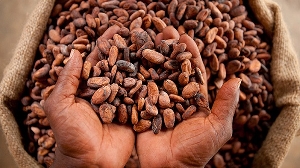A fire outbreak has razed down up to 30 hectares of farmlands in Abia state according to Cocoa Farmers Association of Nigeria (CFAN) reported by Bloomberg.
The fire outbreak could result in a 4% drop in supply and a loss of about 11,000 tons of the chocolate ingredient pod during the mid-crop harvest season. In total, the mid-crop harvest ranges between 280,000 tons to 300,000 tons.
The zonal Chairman of CFAN, John Kalu said, fires in Abia State were caused by farmers setting lands ablaze as a quicker and more cost-effective method of clearing land in preparation for the upcoming planting season.
The situation has been exacerbated by strong winds from the prevailing dry Harmattan weather.
Effects of drop in supply
The potential drop in output will exacerbate the global supply shortfall exerting pressure on the global prices of the commodity, which have doubled over the past year, reaching a more than 40-year high. This surge comes as growing regions in West Africa, responsible for the majority of global supply, face severe impacts from extreme weather conditions.
Last week, cocoa futures soared to record levels due to worries about tight global supplies following drought and disease damage to crops in leading West African producers.
Implied volatility, a crucial measure of options costs, has doubled since mid-January, with a notable premium being paid for calls that safeguard against potential price increases in the coming months.
Nigeria’s cocoa exports
Cocoa is a major source of foreign exchange to Nigeria and arguably the nation’s biggest agricultural export in recent times.
According to the Q3, foreign trade report from the NBS, Nigeria earned around N42.24 billion from cocoa export within the period.
In the first nine months of 2023, Nigeria raked in around N157.77 billion from cocoa exports mainly propelled by a hike in cocoa prices over the global shortfall in supply.
Click to view details



Business News of Sunday, 11 February 2024
Source: nairametrics.com

















